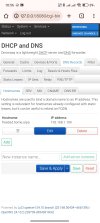nxjoseph@
Developer
Hi,
Recently I have been disabled ntpd on boot and got avoid from DHCP because bootup delay while there isn't a link since my old second router (openwrt wifi bridge with relayd) is still booting.
I have a nginx server running for my poudriere builds to check from phone when I'm laying down or something. Entering local domain of my computer to address bar works if I enabled and used DHCP to retrieve connection, otherwise, with static IP configuration, I am only able to do it with the ip of computer, domain way doesn't work like it's unknown to others.
Thanks in advance, I hope that's the right category for my thread.
Recently I have been disabled ntpd on boot and got avoid from DHCP because bootup delay while there isn't a link since my old second router (openwrt wifi bridge with relayd) is still booting.
I have a nginx server running for my poudriere builds to check from phone when I'm laying down or something. Entering local domain of my computer to address bar works if I enabled and used DHCP to retrieve connection, otherwise, with static IP configuration, I am only able to do it with the ip of computer, domain way doesn't work like it's unknown to others.
Thanks in advance, I hope that's the right category for my thread.


